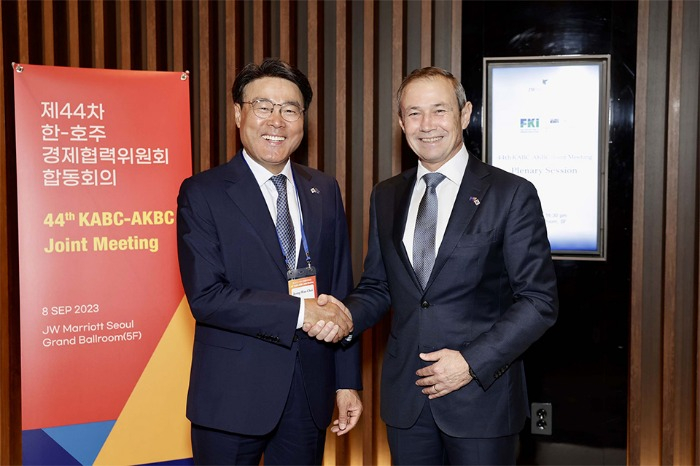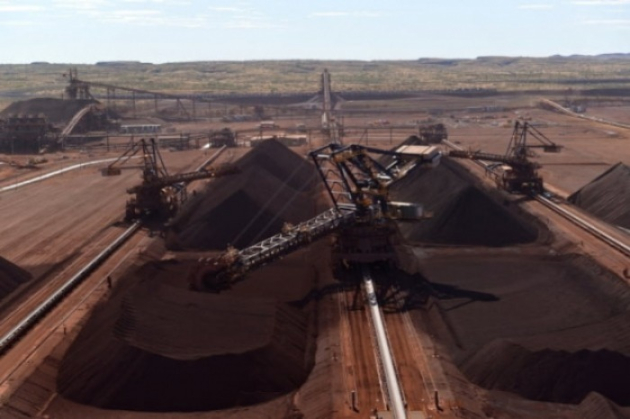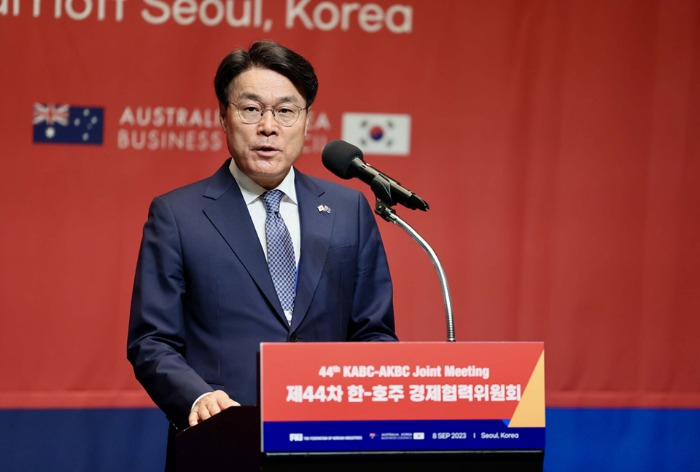Hydrogen economy
POSCO to lead Korea-Australia hydrogen, minerals partnership
The steel giant is expanding its partnership with Australia to produce low-carbon energy, battery materials
By Sep 08, 2023 (Gmt+09:00)
2
Min read
Most Read
LG Chem to sell water filter business to Glenwood PE for $692 million


Kyobo Life poised to buy Japan’s SBI Group-owned savings bank


KT&G eyes overseas M&A after rejecting activist fund's offer


StockX in merger talks with Naver’s online reseller Kream


Mirae Asset to be named Korea Post’s core real estate fund operator



POSCO Group, South Korea’s largest steelmaker, will lead the country's efforts to cement a partnership with Australia in a broader range of areas from core minerals and clean energy to national security, the company said on Friday.
“South Korea and Australia are actively creating new areas of cooperation, including core minerals and hydrogen beyond their long-standing partnership,” POSCO Group Chairman Choi Jeongwoo said in an opening speech for the Korea-Australia Joint Council’s 44th meeting held in Seoul on Sept. 8.
He chairs the council, which was launched in 1979.
Roger Cook, premier of Western Australia, said at the meeting that the state will beef up cooperation with South Korean companies not only for resource development and raw material production, but also technology research on new and renewable energy and eco-friendly materials.
Particularly, he emphasized the Australian government’s dedication to POSCO’s projects in the state to produce hot briquetted iron (HBI), rechargeable battery materials and hydrogen.

HBI is a processed product made after removing oxygen from iron ore. It is a core mineral of high-grade steel produced at electric furnaces, which are replacing conventional furnaces, a contributor to greenhouse gas emissions.
At the meeting, they pinpointed five sectors where they could strengthen cooperation: research and development, core mineral development, national defense/aerospace, food/bio and clean energy such as hydrogen.
Regarding R&D, South Korean research institutes proposed joining forces with Australia to develop decarbonization technology such as carbon capture and storage.

Under the topic of core minerals, presentations were made on the need to build a stable supply chain of secondary battery raw materials such as lithium and rare earths between the two countries, led by Australian mining companies Pilbara Minerals and Arafura Resources, as well as POSCO Holdings Inc.
Regarding defense and food industries, Australian mining company ANCA, South Korea’s aircraft components maker Hanwha Aerospace Co., POSCO International Corp. and Lotte International Co. addressed the importance of strengthening their partnerships with the Oceanian country.
POSCO Holdings and Korea Zinc Inc. also asked for regulatory support from both governments to expand their green hydrogen projects in Australia.
The steel giant has been stepping up investments in Australia through M&As and joint mining projects as POSCO International is accelerating its push to transform into an eco-friendly company beyond a trading and energy exploration firm.
Australia is rich in resources such as iron ore, coal, lithium and rare earth, essential for electric vehicle batteries, as well as in renewable energy such as hydrogen and solar power.
Trade volume between South Korea and Australia reached $63.7 billion in 2022. South Korea’s investment in Australia amounted to $1.5 billion, double 2019's figure.
Write to Sun-Mi Kang at misunny@hankyung.com
Yeonhee Kim edited this article.
More to Read
-
 EnergyAffiliate of S.Korea's POSCO Int'l to supply natural gas in Australia
EnergyAffiliate of S.Korea's POSCO Int'l to supply natural gas in AustraliaAug 10, 2023 (Gmt+09:00)
1 Min read -
 Corporate strategyPOSCO International to transform into green company by 2030
Corporate strategyPOSCO International to transform into green company by 2030Apr 13, 2023 (Gmt+09:00)
1 Min read -
 SteelPOSCO to produce low-carbon steel raw material in Australia
SteelPOSCO to produce low-carbon steel raw material in AustraliaFeb 14, 2023 (Gmt+09:00)
1 Min read
Comment 0
LOG IN


